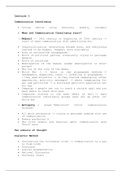Samenvatting
Communication Consultancy, Notes From Lectures Summary of All Articles
Everything you need to pass a Communication Consultancy course! Contains elaborative notes from lectures AND summary of ALL the articles in the course 2019.
[Meer zien]




